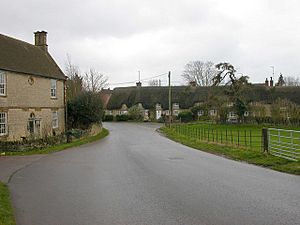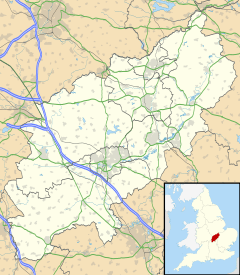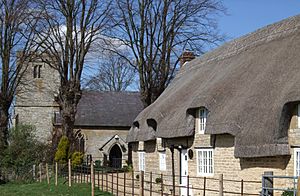Alderton, Northamptonshire facts for kids
Quick facts for kids Alderton |
|
|---|---|
 Alderton |
|
| Population | 248 (with Grafton Regis) 2010 est.109 (Alderton) |
| OS grid reference | SP7446 |
| • London | 62 miles (100 km) |
| Civil parish |
|
| District |
|
| Shire county | |
| Region | |
| Country | England |
| Sovereign state | United Kingdom |
| Post town | TOWCESTER |
| Postcode district | NN12 |
| Dialling code | 01327 |
| Police | Northamptonshire |
| Fire | Northamptonshire |
| Ambulance | East Midlands |
| EU Parliament | East Midlands |
| UK Parliament |
|
Alderton is a small village in England. It is located about 9 kilometres (6 miles) south of Northampton. The village is also about 16 kilometres (10 miles) north of Milton Keynes. It sits between two main roads, the A5 and the A508. The closest large town is Towcester, which is about 5 kilometres (3 miles) north.
Alderton is well-known for the remains of an old Norman castle. This castle is called "The Mount" by local people. It is a special English Heritage site. The castle was even featured on the TV show Time Team.
Contents
About Alderton's Population
In 2001, Alderton's population was counted with the nearby village of Grafton Regis. Together, the two villages had 248 people living in 94 homes. Most of these people lived in Grafton Regis. By 2009, it was estimated that Alderton itself had about 109 residents. In the 2011 census, Alderton's population was still counted as part of Grafton Regis.
How Alderton is Governed
Alderton used to be part of Grafton Regis for local government since 1935. However, Alderton got its own independent Parish Council back on April 1, 2004.
Today, the local council for Alderton is West Northamptonshire. Before 2021, it was part of South Northamptonshire and Northamptonshire County Council.
Alderton's Location and Landscape
Alderton is located on the southern side of the River Tove valley. The river flows east between Alderton and the village of Stoke Bruerne to the north. From Alderton, you can clearly see the church in Stoke Bruerne and the Stoke Park Pavilions in the distance.
A Look Back at Alderton's History
The name Alderton means "Farm or settlement connected with Ealdhere." This tells us it's a very old place!
Early Settlements and Roman Times
People lived in Alderton as far back as the Iron Age. Later, the Romans built important roads nearby. One of these was Watling Street, which is now the A5 road. It's only about 0.8 kilometres (0.5 miles) southwest of the village. Roman items like pottery have been found here. Large Roman villas and farms were also set up nearby. The closest known Roman villa was at Piddington, about 10 kilometres (6 miles) away. Even older Iron Age and Saxon items have been found at "The Mount."
Saxon and Norman Eras
Alderton grew into a larger Saxon settlement. It's believed a Saxon fort, called a burh, stood on the high ground, including the Mount site. The village was on the border between the Saxon kingdoms in the south and the Danelaw in the north.
After the Norman conquest in 1066, the ringwork castle (The Mount) was built. This was one of the strongholds owned by Robert, Count of Mortain. He was the half-brother of William the Conqueror. It was a large earthwork built quickly to help defend William's new kingdom. Twenty years later, the Domesday Book mentioned Alderton as "Aldrintone." It listed the Earl of Ferrers as the local lord.
Later Medieval and Tudor Times
Archaeologists believe the castle was left empty in the late 1300s. This was around the time of the Black Death. Many people died then, and the local population likely dropped a lot. Alderton then came under the control of the Manor of Stoke Bruerne.
Alderton remained a very small community during the 14th and 15th centuries. By 1541, King Henry VIII included the village in his special area called the Honour of Grafton. The village population started to grow in the late 1500s. This was when William Gorges, a nobleman, arrived. Gorges built a very large mansion with beautiful gardens. His daughter, Frances, married Thomas Hesilrige. This is how the Manor House passed to the Heselrige family.
Royal Visits and Civil War
In August 1605, Queen Anne of Denmark stayed at Alderton Manor. She visited again in August 1608. During this visit, she wore a white satin dress with silver buttons. She even gave money to musicians who played for her. At this time, King James I made Thomas Hesilrige a knight at Grafton. He later became a baronet. Thomas Hesilrige's son, Sir Arthur Hesilrige, 2nd Baronet, was an important person during the English Civil War. He was a friend of John Pym and Oliver Cromwell. He was also one of the Five Members of Parliament who King Charles I tried to arrest. Sir Arthur was Lord of the Manor in 1655.
Alderton Today
By the early 1700s, Alderton was a busy farming community. The old Manor House was pulled down. A large farm, called Manor Farm, was built where it stood. The village population stayed small and mostly worked in farming for a long time. More recently, Alderton has changed. It is now a place where professional people live and travel to work from. It is also a special conservation area.
Historic Buildings and Structures
The Mount: Alderton's Castle Remains
"The Mount" is what's left of a ringwork castle. Today, it is covered with trees. The earthworks, which are the old defensive mounds and ditches, are still in good condition. They cover an area of about 0.8 hectares (2 acres). The ditch around the castle is 5 metres (16 feet) deep in some places. You can still walk around it. Inside the castle area, there are slightly raised spots. These are thought to be where buildings once stood.
The castle and Manor of Alderton were sold to Pagan de Chaworth during the reign of Edward I. During the first English Civil War, there were battles nearby. One important event was the attack on Grafton Manor House in 1644. Parliamentarian soldiers involved in this battle passed through Alderton. There isn't much proof that the castle was used much during this time. Some musket balls from the Civil War have been found. However, they might be from musket practice. It is known that in the 1700s, the site was used as a shooting range for gentlemen.
In the Victorian era, the castle seems to have been a popular place for picnics. This is based on old porcelain and glass pieces found there. People still use it as a village park today. In 1998, Derek Batten, a local resident, bought the castle site.
When Time Team Visited The Mount
"The Mount" is a special ancient monument. Usually, the TV show Time Team would not be allowed to dig there. But because so little was known about this type of castle, English Heritage gave them permission. They were allowed to dig in three specific areas. One was in the ditch around the castle. Another was on the ramparts (the defensive banks). The third was inside the castle walls. The goal was to learn as much as possible without damaging the site too much. The TV show about Alderton was shown on January 14, 2001. You can find a summary on the Time Team website.
Discovering a Medieval Stone Castle
In August 2009, archaeologists found something exciting. They believed they had found the remains of the only medieval stone castle in South Northamptonshire. This discovery happened eight years after the Time Team visit.
Church of St Margaret
The village church, called the Church of St Margaret, was built between 1522 and 1528. It was later changed in 1848. Inside, there is a monument to Sir William de Combermartin, who died around 1318.
Alderton Manor House
The current Manor House building dates back to 1695.
Famous People from Alderton
Sir Arthur Hesilrige lived in Alderton. He was one of the five MPs that King Charles I tried to arrest in 1642. This event was a big part of the lead-up to the English Civil War.
Visiting The Mount
The Mount is open for the public to visit. However, there isn't much parking in Alderton, except along the main road. Be careful when climbing the steep steps to the top of the ringworks. Also, watch out for the steep slopes on the sides. Please respect the privacy of the homes next to the site.
 | Misty Copeland |
 | Raven Wilkinson |
 | Debra Austin |
 | Aesha Ash |



